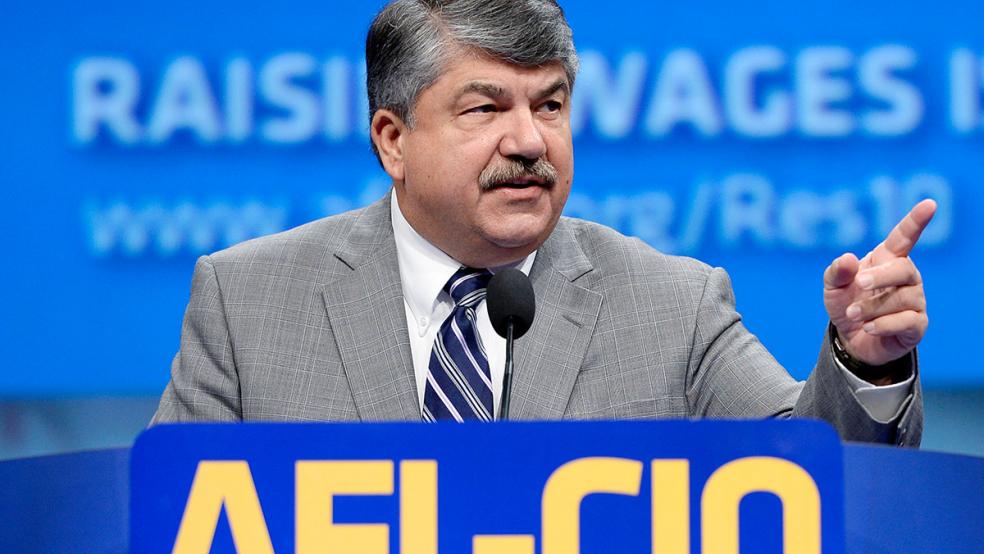When President Obama was reelected in November 2012, labor leaders eagerly counted on payback for helping to deliver the critical states of Ohio, Wisconsin and Nevada.
“We did deliver those states,” AFL-CIO president Richard Trumka boasted back then. “Without organized labor, none of those states would have been in the president’s column.”
Related: Keystone Pipeline: Job Creator or Environmental Menace?
Nearly 16 months later – with yet another crucial election on the horizon -- Trumka and other organized labor leaders grouse that they have little to show for their fealty to Obama:
- The AFL-CIO, Teamsters and construction trades unions are pressing for administration approval of the Keystone XL pipeline between Canada and the Gulf Coast to create thousands of jobs for their members. But so far, Obama has shared the concerns of environmental groups that the pipeline won’t produce many permanent jobs and could pose an environmental threat.
- Major labor groups say the Affordable Care Act is undercutting union-sponsored health insurance programs and will encourage employers in the long term to cut workers’ hours to avoid having to provide them with health insurance.
They complain that Obamacare may end up “destroying” the union’s multi-employer health plans. Under the administration’s current interpretation of Obamacare, union members with so-called “Taft-Hartley“ non-profit plans would not be entitled to tax subsidies available to others; they might also get hit with federal taxes to help offset the cost of those subsidies. - Organized labor is also strongly opposed to two proposed free-trade agreements that the administration is trying to push through Congress on a fast-track basis. Displeased with the impact of NAFTA and other major trade agreements, labor leaders fear that the new ones could hurt local jobs and industries.
Related: UAW’s Big Loss in Tennessee Is a Win for Workers
If labor and its Democratic allies on Capitol Hill prevail, that would undercut a major element of Obama’s economic agenda. Senate Majority Leader Harry Reid recently broke publicly with the White House by declaring, “I’m against fast track.”
Trumka said that the AFL-CIO “opposes [the trade] legislation in the strongest terms and will actively work to block its passage.” He added, “It is past time for the United States to get off the corporate hamster wheel on trade.”
Trumka has also repeatedly skewered the White House for refusing to address labor’s concerns about the adverse effects of Obamacare on rank- and-file union members. And James P. Hoffa, president of the International Brotherhood of Teamsters Union, told MSNBC earlier this month, “We’re entirely behind the Keystone project.”
“It’s basically part of our infrastructure,” Hoffa said. “It’s going to put thousands of people to work – not only Teamsters but all of working people. This is something America needs right now.”
Strong Turnout Needed
This is hardly the first time a Democratic president has feuded with organized labor, although it comes at an inopportune time. With Republicans threatening to win back control of the Senate and enhance their majority in the House next November, Democrats will need another strong turnout by labor.
Related: As Unions Lose More Members, Dems See Setbacks
“On those issues, the divisions are real and they’re not trivial,” said William Galston, a former domestic policy adviser to President Bill Clinton. While it’s unlikely many union members would vote for Republican candidates in the fall, he said, Democrats could be badly hurt if union leaders choose to sit out the race.
“The issue is one of enthusiasm and foot power in the run-up to the election,” he said.
The tensions between the White House and organized labor also come as the president heads to Mexico Wednesday for talks with fellow heads of state at the North American Leadership Summit. Trade and the Keystone pipeline are certain to be on the agenda and labor leaders will be listening carefully to what Obama has to say.
There is an element of irony to the feuding between Obama and labor leaders over essentially bread-and-butter issues when both sides have made economic equity and fairness for the middle class the centerpiece of their agendas. “At the core there is a huge overlap between organized labor and the president’s agenda,” noted David Madland, director of the American Worker Project at the liberal Center for American Progress.
Related: Why Organized Labor Is Organizing Against Obama
Moreover, as White House Press Secretary Jay Carney noted on Tuesday, internal Democratic Party battles over trade issues have gone on for years and no doubt will continue.
“We shouldn’t pretend that the wheel has been recreated here when we talk about the differing views that people have on matters of trade expansion,” Carney told reporters.
University of Virginia political scientist Larry Sabato says the rift between Obama and labor “isn't particularly wide or intense, at least not yet.”
“Labor may feel like it's getting half a loaf, but in their view Republicans would let them starve – and they're probably right, since nearly all of labor's money and muscle goes to backing Democrats,” he said. “So labor still has plenty of incentive to support Democrats in the fall.”
A more intriguing question, says Sabato, is whether a serious rift develops between Obama and the environmental movement if the president, in the end, sides with labor, business and the Republicans in allowing construction of the Keystone pipeline to go forward.
“Approval of Keystone would send environmentalists into the ozone-depleted stratosphere,” Sabato said. “Increasingly, Democrats at the state and local level depend on the environmental community for money and volunteers.”
Top Reads from The Fiscal Times:





